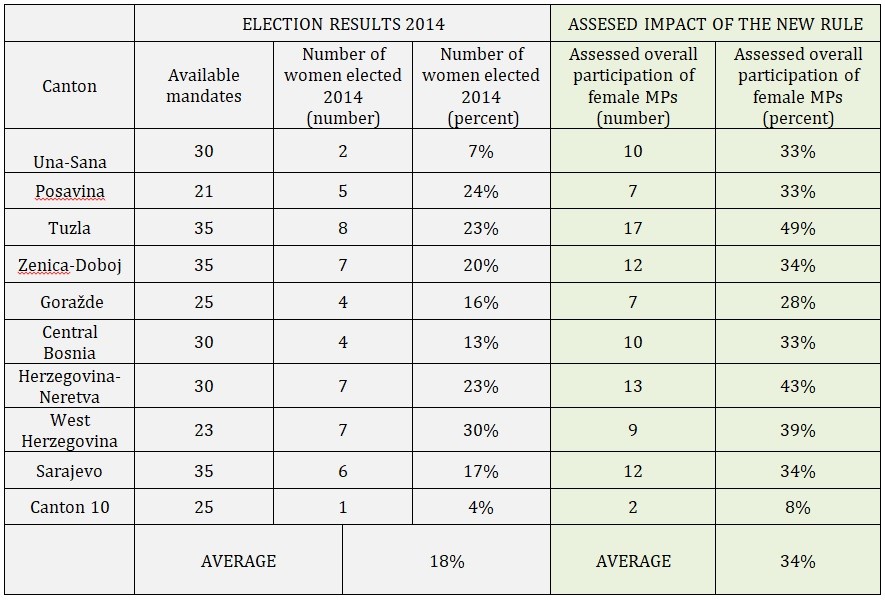Adoption of appropriate measures to ensure that women, on equal terms with men, have the right to be eligible for election to all publicly elected bodies and to hold public office and perform all public functions at all levels of government is one of the key obligations of State parties to the UN’s Convention on the Elimination of All Forms of Discrimination against Women. With the increasing attention and importance of electoral institutions, most countries have introduced affirmative action measures. Introduction of gender quotas in election systems is one of the most popular responses in more than 100 countries worldwide including 26 with legislated quotas.
Gender quotas are part of the electoral system landscape of Bosnia and Herzegovina since 1998. According to Article 4.19 of the Election Law of Bosnia and Herzegovina, each party has to present lists of candidates with at least 40% of candidates of the unrepresented sex with a mandatory ranking rule (“the zipper system”) to be able to participate in the elections.
“Each list of candidates shall include both male and female candidates, who are equally represented. Equal gender representation exists when one of the sexes is represented by at least 40% of the total number of candidates in the list. The candidates of the underrepresented gender shall be distributed on the candidates list in the following manner: At least 1 candidate of the underrepresented gender amongst the first 2 candidates, 2 candidates of the underrepresented gender amongst the first 5 candidates, and 3 candidates of the underrepresented gender amongst the first 8 candidates etc.” (Article 4.19, Election Law of BiH)
There is enough evidence that quotas such as this one are affected by a number of factors and most predominantly the design of the electoral system and gender stereotypes which exist in Bosnia and Herzegovina. The impact of these factors has been measured by several authors. According to these assessments, some 15-20% of mandates can be considered “lost” for women. This no surprise if we consider the fact that gender stereotypes continue to play a significant role in political, economic, and private life, undermining the promotion of gender equality. According to a study from 2016 about half of the male respondents and a little over 30% of women in Bosnia and Herzegovina believed that men make better political leaders and should be elected.
These are the reasons why women continue to be underrepresented in parliaments in Bosnia and Herzegovina. Women add up to 23.81% of the MPs in the House of Representatives of the Parliamentary Assembly of BiH, 21.43% MPs in the Parliament of the Federation of Bosnia and Herzegovina (FBiH) and 14.45% MPs in the National Assembly of the Republika Srpska (RS). At the cantonal and local level (municipalities and cities) women make approximately 18% of local municipal councilors. According to IPU, BIH is currently ranked 84th in the world. Women representation is close to the world average of 23.4%, under the European average 26.4% and even below the former Yugoslav countries average (BiH, Croatia, Montenegro, Macedonia, Serbia, and Slovenia) which is at 25%.
There were several attempts to amended the Election Law which aimed at increasing the number of women elected such as the proposal to introduce the closed list system, parity on the list and even combinations with the „lucky loser system.“ The Election Law was only amended to introduce the 40% quota (instead of the 33%) in 2013 with almost no impact on the number of women elected.
The Election Law of Bosnia and Herzegovina was last time amended in 2016 and has affected how mandates are allocated after the elections. According to this rule, only those candidate who won more than 20% of votes will be able to move up their list. If not, the mandates will be allocated according to their ranking on the list of candidates. According to this rule, the openness of the list is limited to the 20% threshold.
There is no evidence that these amendments aimed to impact the participation of women. The explanatory memorandum contains no legislative or gender impact analysis. On the contrary, the proponent intended to delete the ranking order rule (“the zipper system”) a threat which was diverted.
The Legislative/Gender Impact Analysis of the 2016 amendments
This article aims to assess the impact of the 2016 amendments of the impact of article 4.19 on the overall participation of women in legislatures. It is based on the application of the new rule on the results of General elections 2014. The assessed impact is different when applied to the results for legislatures on different levels of government.
At the level of the Parliamentary Assembly of BiH, the impact is gender neutral. The open list system has allowed the electorate to affect the ranking of 5 candidates (4 in favor of men and 1 in favor of a woman). However, all of these candidates have received over 20% as defined by the new rule and would their mandate would not be impacted.
At the level of Parliament of FBIH and the National Assembly of RS, the new rule will increase the impact of Article 4.19. At the Parliament of FBIH, the assessed increase amounts to 5 mandates for female candidates or the overall increase of 5%. At the National Assembly of Republika Srpska, the assessed increase amounts to 3 mandates for female candidates or an overall increase of 2.5%.
At the cantonal assemblies, the new rule will significantly increase the impact of Article 4.19. At this level of governance, the cantons make the election unit and the impact of the gender quota from the Article 4.19 is affected only by the open list system and the number of political parties with elected candidates. The average increase in favor of female candidates’ amounts to 16% for all ten cantons and the overall participation of women would increase to 34%. The situation would differ among the cantons and the assessed percentages would start at 8% and would go as high as 49% (as seen in the picture below).

This assessment points to the conclusion that the new rule will increase the impact of the gender quota from Article 4.19. The final impact will still depend on other factors but the increase in participation of women in the legislatures after the 2018 elections can be expected.


0 comments